Common myths about health and nutrition can create confusion and lead to misguided choices. By examining these misconceptions through the lens of scientific evidence and expert opinions, individuals can gain clarity and make informed decisions about their well-being. Understanding the facts behind these myths is essential for navigating the complexities of health information.
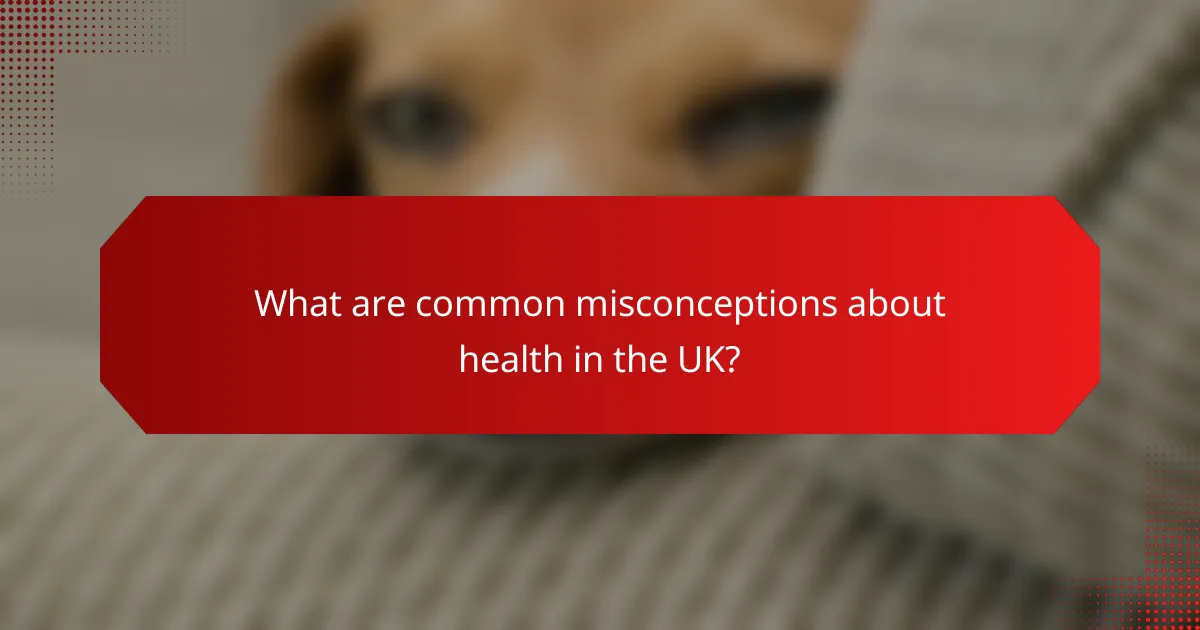
What are common misconceptions about health in the UK?
In the UK, several misconceptions about health can lead to confusion and poor decision-making. Understanding these myths is crucial for making informed choices about personal health and well-being.
Myth: Vaccines cause autism
The belief that vaccines cause autism has been widely debunked by extensive scientific research. Numerous studies involving large populations have shown no causal link between vaccinations and autism spectrum disorders.
In fact, vaccines play a vital role in preventing serious diseases and protecting public health. The UK’s vaccination program adheres to strict safety standards, ensuring that vaccines are both effective and safe for children.
Myth: Natural supplements are always safe
Many people assume that natural supplements are inherently safe, but this is not always the case. Some supplements can interact with medications or cause adverse effects, especially if taken in excessive amounts.
It’s essential to consult with a healthcare professional before starting any new supplement regimen. They can provide guidance on appropriate dosages and potential interactions, ensuring that you make safe choices for your health.

How can we debunk myths about nutrition?
To debunk myths about nutrition, it’s essential to rely on scientific evidence and expert consensus. Understanding the facts behind common misconceptions can help individuals make informed dietary choices.
Fact: Carbs are essential for energy
Carbohydrates are a primary source of energy for the body, especially for the brain and muscles during physical activity. They break down into glucose, which fuels cellular functions and activities. Without adequate carbohydrate intake, energy levels can drop, leading to fatigue and decreased performance.
When choosing carbohydrates, focus on whole grains, fruits, and vegetables, which provide not only energy but also essential nutrients and fiber. Aim for a balanced diet where carbohydrates make up about 45-65% of your total daily caloric intake, depending on your activity level.
Fact: Fats are necessary for nutrient absorption
Dietary fats play a crucial role in the absorption of fat-soluble vitamins such as A, D, E, and K. These vitamins are vital for various bodily functions, including vision, immune response, and bone health. Without sufficient healthy fats in your diet, you may not fully absorb these essential nutrients.
Incorporate sources of healthy fats, such as avocados, nuts, seeds, and olive oil, into your meals. Aiming for fats to comprise about 20-35% of your daily caloric intake can help ensure you receive adequate nutrients while maintaining overall health.
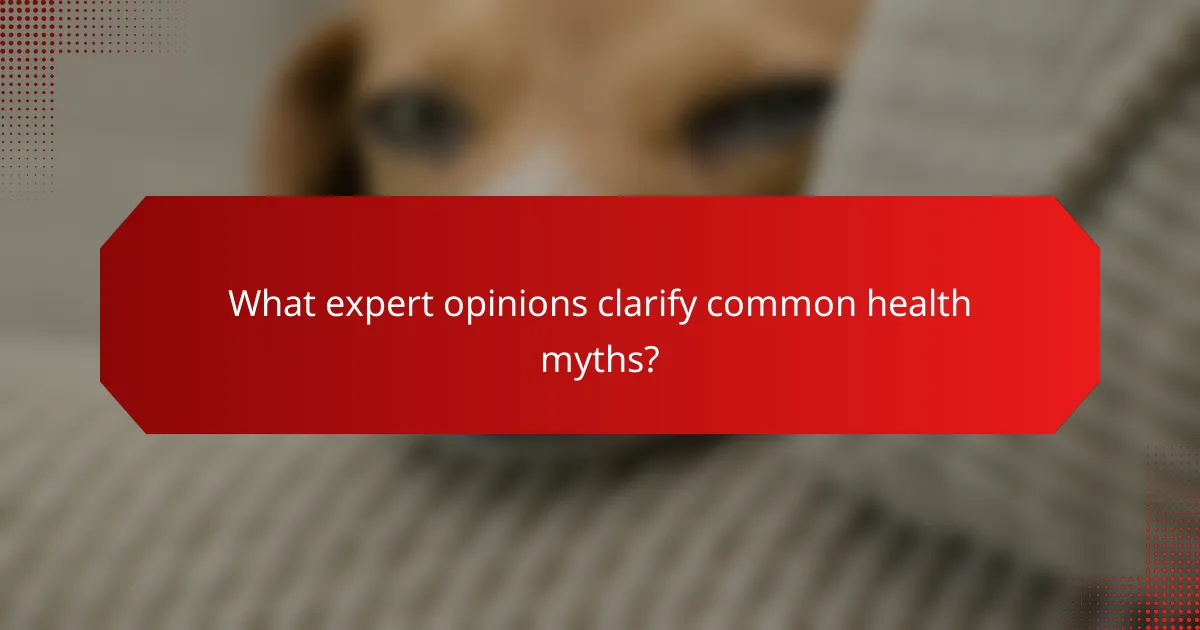
What expert opinions clarify common health myths?
Experts emphasize that many health myths stem from misunderstandings or misinterpretations of scientific evidence. By relying on evidence-based medicine, individuals can better discern fact from fiction in health-related claims.
Expert view: The importance of evidence-based medicine
Evidence-based medicine (EBM) integrates clinical expertise with the best available research to inform healthcare decisions. This approach helps practitioners evaluate the validity of health claims and ensures that treatments are supported by solid data.
For instance, a treatment that shows a significant improvement in clinical trials is more likely to be effective than anecdotal reports. Patients should seek information from reputable sources that adhere to EBM principles to avoid falling for misleading health myths.
Expert view: Misinterpretation of scientific studies
Many health myths arise from the misinterpretation of scientific studies, often due to sensationalized media coverage. Experts caution that correlation does not imply causation, meaning that just because two factors are linked does not mean one causes the other.
For example, a study might find that people who consume a certain food have lower rates of a disease, but this does not prove that the food prevents the disease. It’s crucial for individuals to critically assess research findings and consult healthcare professionals when interpreting such information.
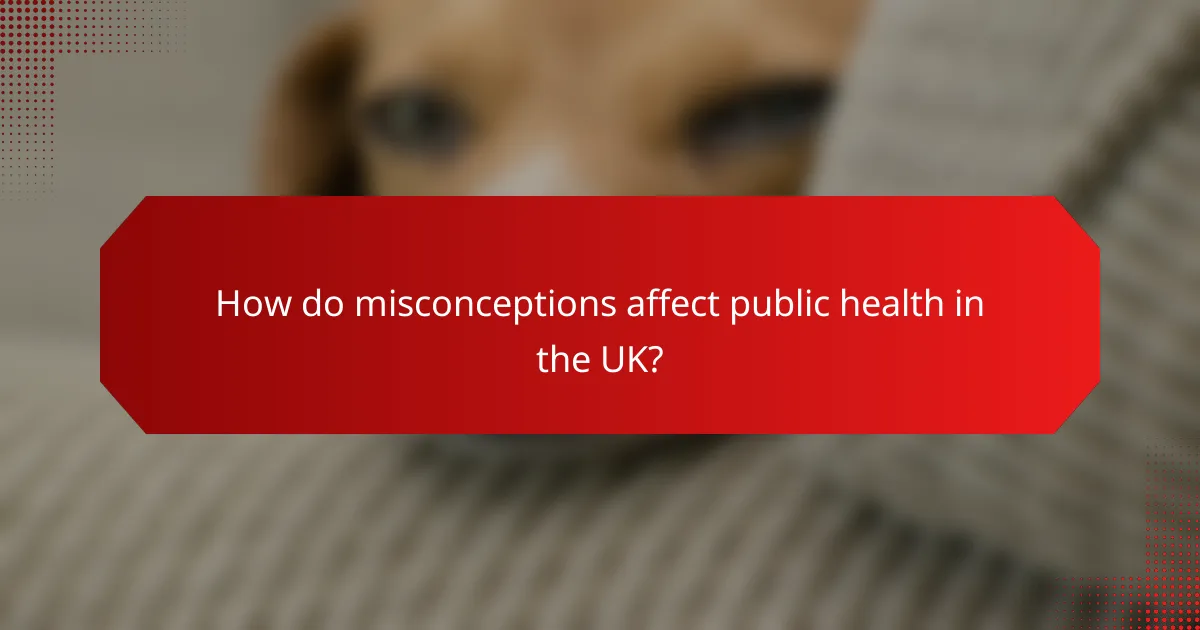
How do misconceptions affect public health in the UK?
Misconceptions can significantly undermine public health initiatives in the UK by creating distrust and leading to poor health decisions. These false beliefs often result in decreased participation in health programs and can exacerbate health disparities across communities.
Impact on vaccination rates
Misconceptions about vaccines, such as the false link between vaccinations and autism, have led to decreased vaccination rates in certain populations. This decline can result in outbreaks of preventable diseases, putting vulnerable individuals at risk.
To counteract these myths, public health campaigns must focus on providing clear, evidence-based information. Engaging with communities through trusted local leaders can help dispel fears and encourage higher vaccination uptake.
Influence on dietary choices
Common myths surrounding nutrition, such as the belief that all fats are harmful, can lead to poor dietary choices and health outcomes. Misunderstandings about food labeling and dietary supplements can further complicate individuals’ ability to make informed decisions.
To promote healthier eating habits, it is essential to educate the public on balanced diets and the importance of moderation. Providing straightforward guidelines, such as the benefits of whole foods over processed options, can help individuals navigate their dietary choices more effectively.
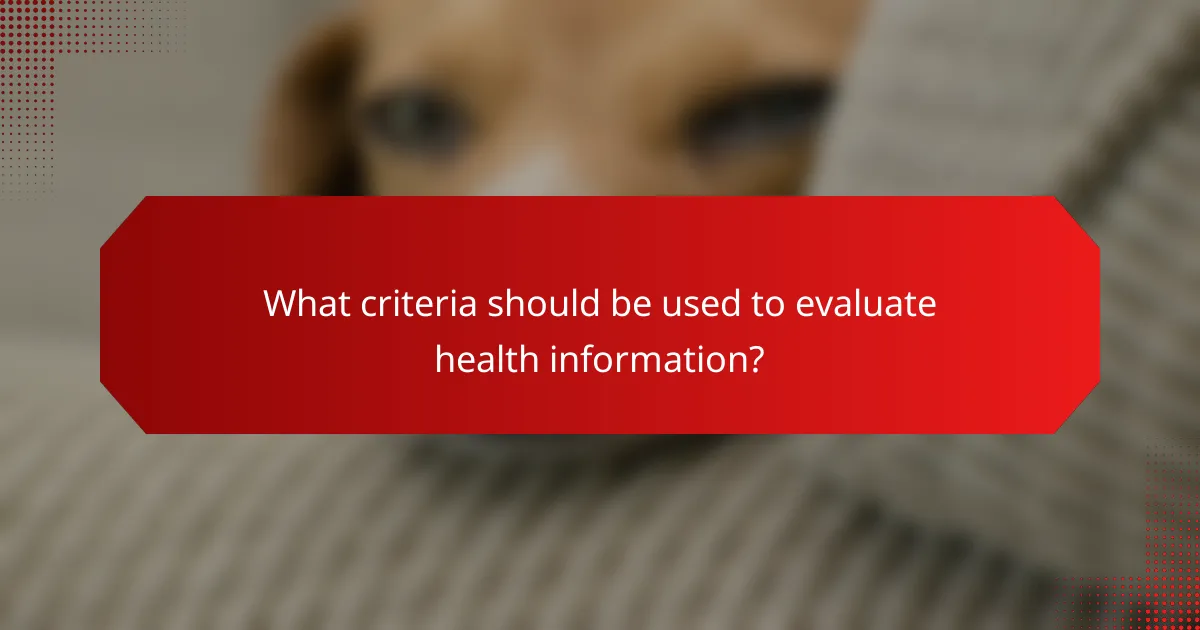
What criteria should be used to evaluate health information?
To evaluate health information effectively, consider the credibility of the source and the quality of the evidence presented. These criteria help ensure that the information is reliable and applicable to your health decisions.
Source credibility
Source credibility refers to the trustworthiness and authority of the organization or individual providing the health information. Look for sources that are well-known, such as government health agencies, reputable medical institutions, or recognized health professionals.
Check for qualifications, such as degrees or certifications, and assess whether the source has a history of providing accurate information. Be cautious of sources that lack transparency or have a commercial interest in promoting specific products.
Evidence quality
Evidence quality involves evaluating the research and data supporting the health claims made. High-quality evidence typically comes from peer-reviewed studies, clinical trials, or systematic reviews that follow rigorous scientific methods.
Consider the sample size, study design, and potential biases in the research. Look for consensus among multiple studies rather than relying on a single source, as this can provide a more balanced view of the health information.
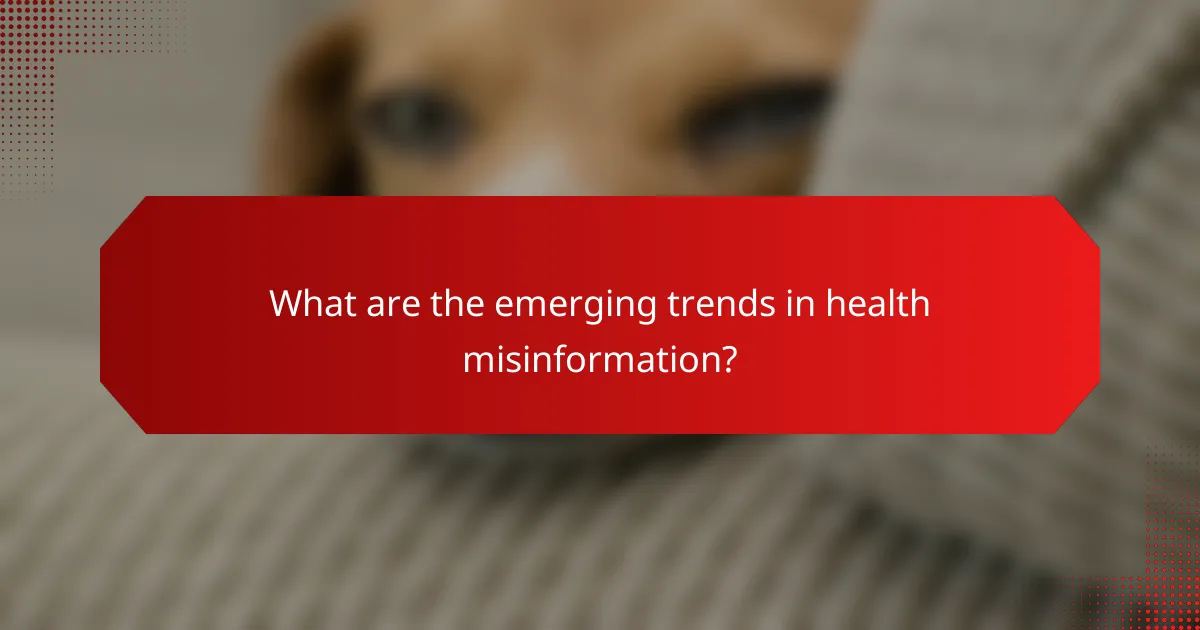
What are the emerging trends in health misinformation?
Emerging trends in health misinformation highlight the growing impact of digital platforms and evolving societal concerns. As more people turn to online sources for health information, the spread of false or misleading content has intensified, particularly regarding mental health and wellness.
Rise of social media influence
The influence of social media on health misinformation is significant, as platforms can rapidly disseminate unverified claims to vast audiences. Users often share health-related content without verifying its accuracy, leading to widespread misconceptions. For example, viral posts about miracle cures or unproven treatments can mislead individuals seeking genuine solutions.
To combat this, users should critically evaluate sources before sharing health information. Checking for credentials, looking for peer-reviewed studies, and consulting healthcare professionals can help ensure the information is accurate. Avoiding sensational headlines and relying on reputable organizations can also mitigate the spread of misinformation.
Increased focus on mental health misconceptions
Misconceptions surrounding mental health are increasingly prevalent, with many individuals holding erroneous beliefs about mental illnesses and their treatments. Common myths include the idea that mental health issues are a sign of weakness or that therapy is only for severe conditions. These misconceptions can prevent people from seeking help and perpetuate stigma.
Addressing these myths is crucial for promoting mental health awareness. Educational campaigns that provide accurate information about mental health can help dispel false beliefs. Encouraging open discussions about mental health and sharing personal experiences can also foster a more supportive environment for those in need.

How can individuals combat health myths effectively?
Individuals can combat health myths by seeking accurate information and engaging with qualified professionals. This proactive approach helps to clarify misconceptions and promotes informed health decisions.
Engage with healthcare professionals
Consulting healthcare professionals is crucial for debunking health myths. Doctors, nurses, and dietitians can provide evidence-based information tailored to individual needs. Regular check-ups and open discussions about health concerns can help clarify any misconceptions.
When engaging with professionals, prepare specific questions about health topics that concern you. This ensures that you receive targeted advice and reduces the risk of misinformation. Remember, it’s okay to seek a second opinion if something doesn’t seem right.
Utilize reliable health resources
Accessing reliable health resources is essential for combating myths. Websites from reputable organizations such as the World Health Organization (WHO) or the Centers for Disease Control and Prevention (CDC) offer trustworthy information. Look for resources that cite scientific research and expert consensus.
Be cautious of sources that lack credibility, such as personal blogs or unverified social media posts. A good rule of thumb is to verify information across multiple reputable sources before accepting it as fact. Bookmarking reliable sites can streamline your search for accurate health information.
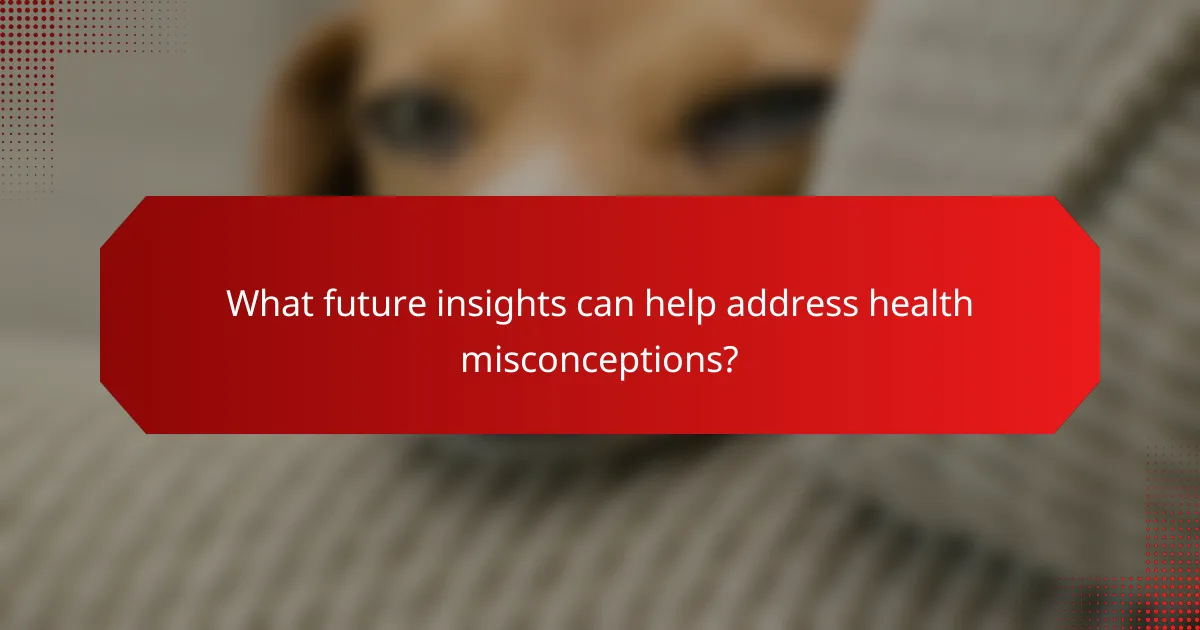
What future insights can help address health misconceptions?
Future insights that can help address health misconceptions include improved health literacy and the integration of technology to combat misinformation. By enhancing public understanding of health topics and utilizing advanced tools, we can reduce the spread of false information and promote healthier choices.
Advancements in health literacy programs
Health literacy programs are evolving to better educate the public about medical information and health practices. These programs often use interactive methods, such as workshops and online courses, to engage participants and improve their understanding of health-related topics.
For example, community organizations may offer free classes that cover nutrition, exercise, and disease prevention. By focusing on practical skills and knowledge, these initiatives empower individuals to make informed health decisions and dispel common myths.
Role of technology in misinformation detection
Technology plays a crucial role in identifying and combating health misinformation. Advanced algorithms and artificial intelligence are increasingly used to analyze online content and flag potentially false claims. This helps users access accurate information more easily.
For instance, social media platforms are implementing fact-checking features that provide users with reliable sources when they encounter questionable health information. Additionally, mobile applications can guide users to trustworthy health resources, reducing the likelihood of misinformation spreading.
